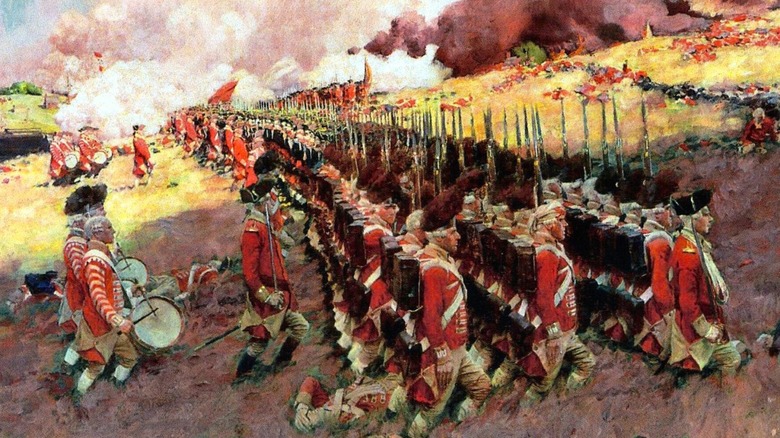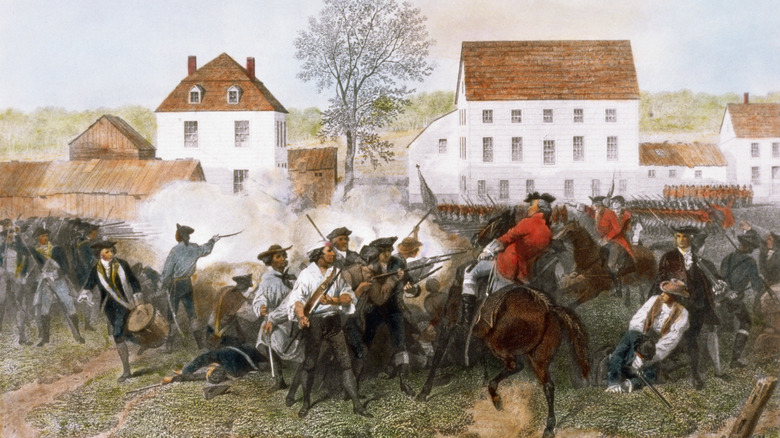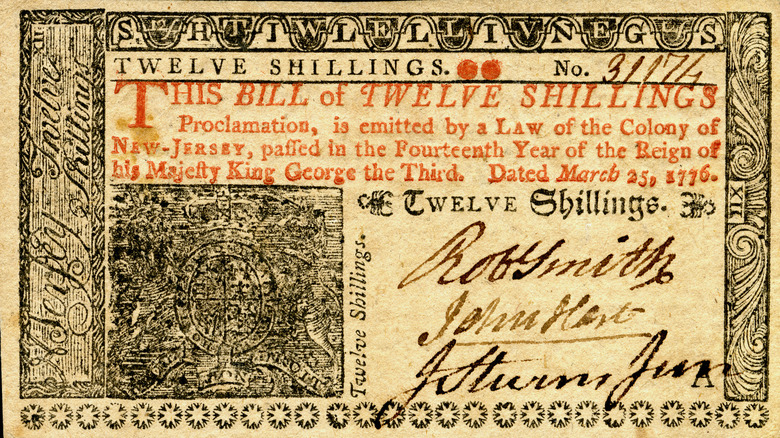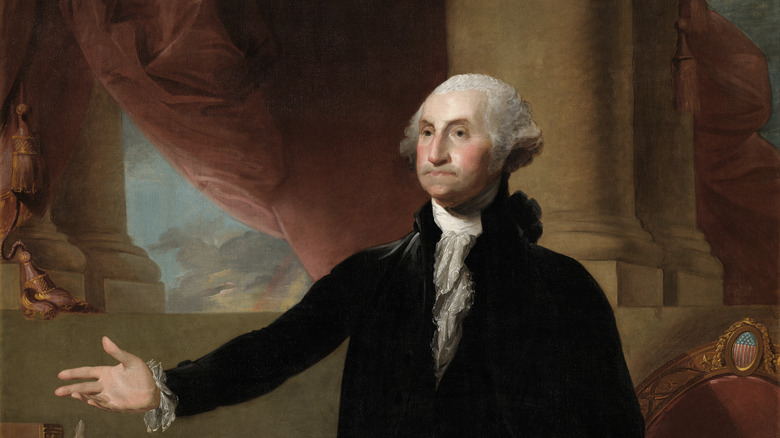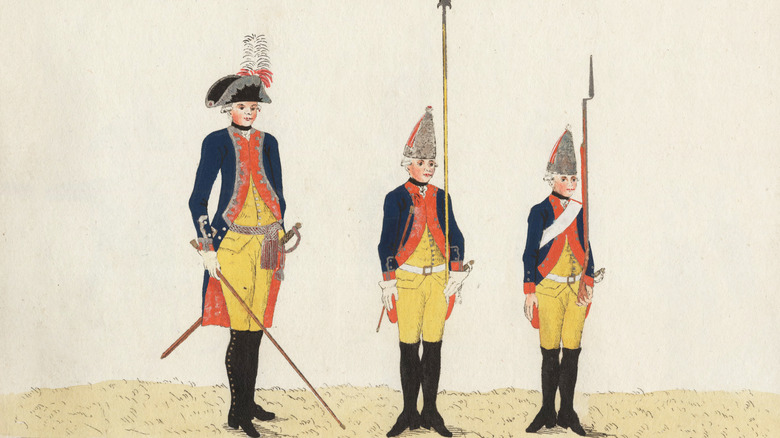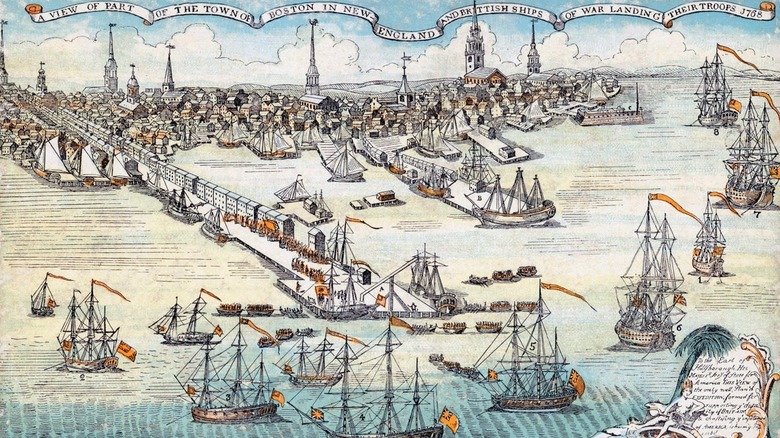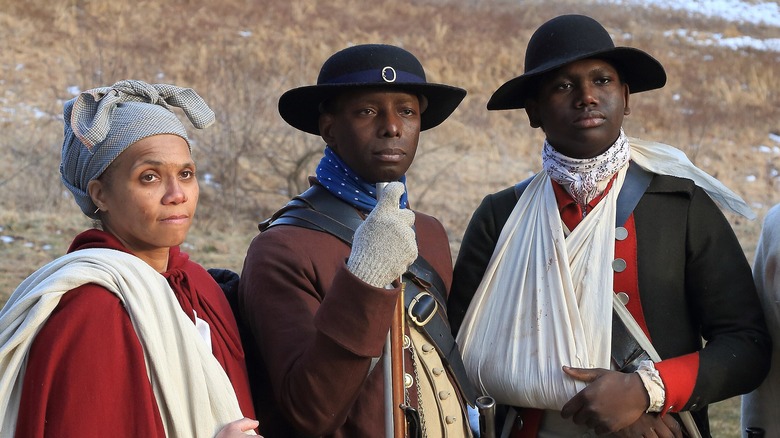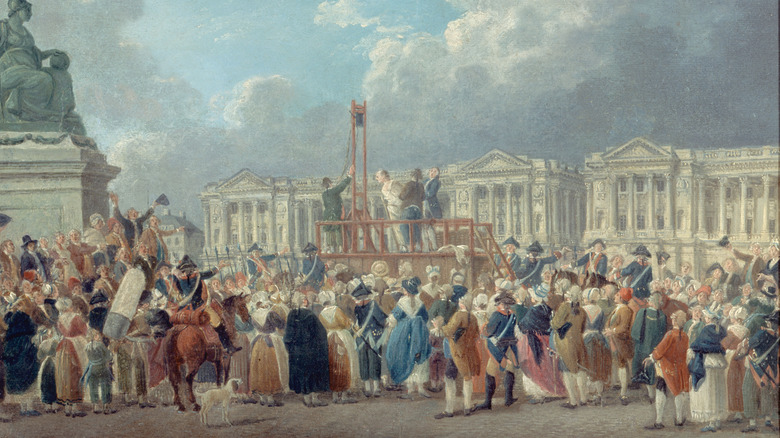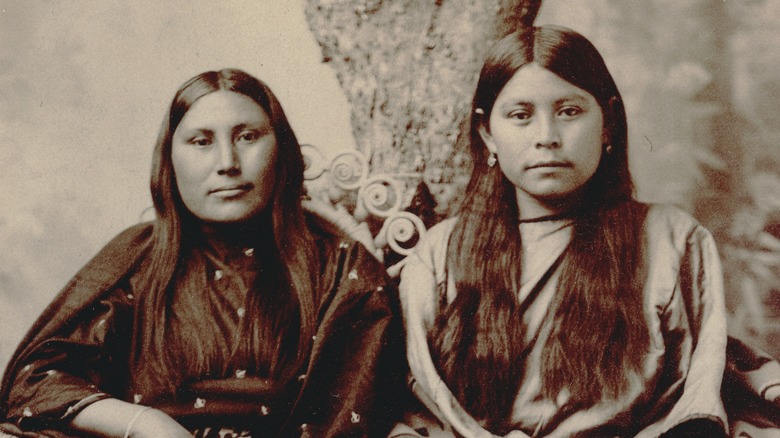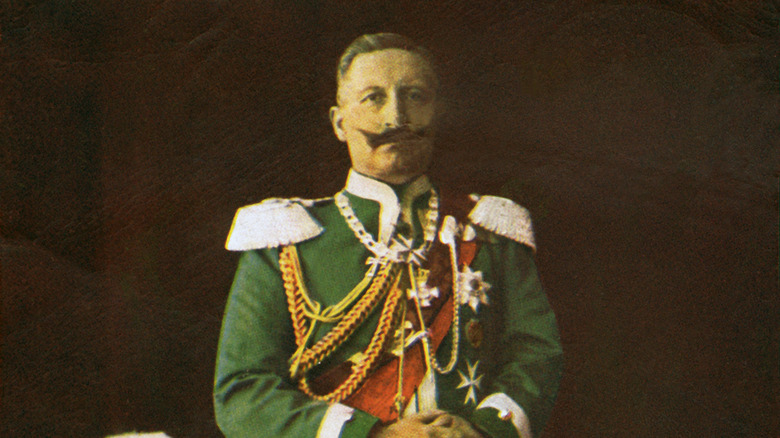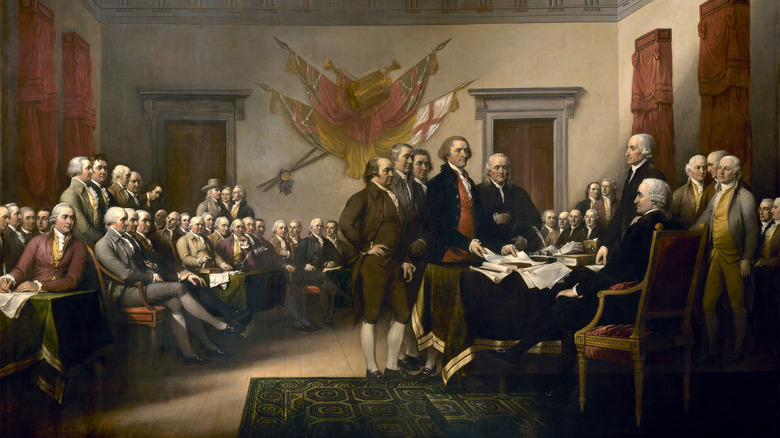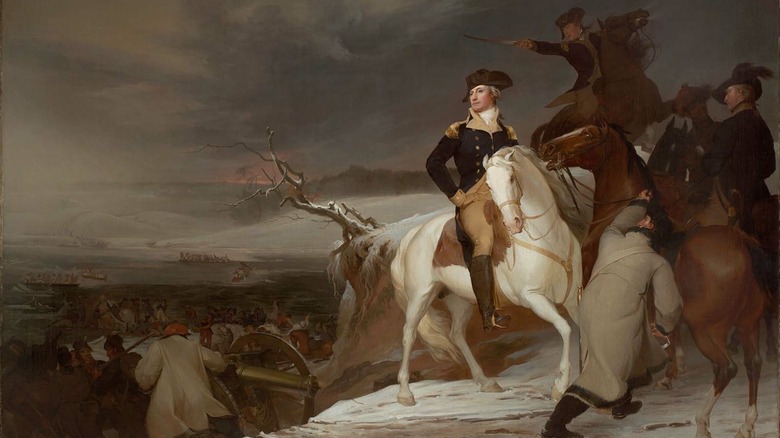What If Britain Had Won The Revolutionary War?
Take a history class in an American high school somewhere, and chances are good that the American Revolution will be taught as if it were inevitable. Students who are presented with the march of historic facts and phrases — taxation without representation, the Boston Massacre, the Declaration of Independence, the Battle of Yorktown — may certainly feel as if such events had to happen. But the truth is that the colonists' victory in the revolution was never assured. In fact, it was oftentimes downright shaky, with the Continental Army depending heavily on help from foreign powers like France. Meanwhile, the British government considered military action in retaliation for the December 1773 Boston Tea Party as early as 1774. However, it went with legislation meant to punish colonial Massachusetts, later known derisively as the Intolerable Acts and which may well have spurred colonists to rebel.
But what if Britain had brought the full force of its military down upon the unsettled colonies early on? What if France had backed away from supporting the revolution? Any number of decisions may have called the war for the growing British Empire and brought the American colonies back into the fold. What exactly would that mean for colonists and their rebel leaders? While it's hard to chart the course of a history that never happened, it hasn't stopped people from speculating. It helps that Britain had some clear and not-so-clear plans for what it intended to do with the colonies once it got the rebels under control.
Even common folk may have faced serious retribution
If the British had routed the rebels, chances are that practically everyone would face a backlash. Some British troops had already gained notoriety for committing what might now be deemed war crimes. Then, there's the third amendment to the U.S. Constitution, which forbids military troops from taking over private homes without the owner's consent — a reaction to the days of less conscientious British troops.
Then, in 1780 Virginia, a Continental force that surrendered to British troops that were under the command of Colonel Banastre Tarleton was slaughtered, resulting in an estimated 113 deaths and another 150 wounded. In response, fired-up colonists would cry "Tarleton's quarter!" when attacking British soldiers, meaning that they would hold back nothing, just as the British commander had done. To be fair, colonists also committed sometimes difficult-to-imagine crimes, including putting suspected Loyalists through the painful ordeal of tarring and feathering.
Given how violent on-the-ground actions got during the American Revolution, it's reasonable to suspect that some British troops might have committed a few more acts of vengeance against the failed rebels before they were reigned in. This likely wouldn't have been restricted to members of the military, either, as sometimes violent conflicts between noncombatant loyalists and revolutionaries pepper accounts of the war. George III alluded to punishment in his 1775 Proclamation of Rebellion, which acknowledged that the colonies were out of line and that its organizers were due some vaguely-defined but nonetheless ominous retribution.
The colonies would have hit hard economic times
Losing colonists would have seen their economy take a major hit. In fact, it already had seen damage on both sides of the conflict. The colonies scrambled to pay for the war, wrangling with a depressed economy just as the new nation was getting started. Britain, meanwhile, was left with heavy debts after its failed war, to the tune of some £250 million (when combined with pre-existing debts from the earlier Seven Years' War). Perhaps Britain would have brought taxes back in force to pay off some of its crushing debts, in turn putting serious pressure on colonists who had already been hit from the other side by the economic woes of the Continentals. American colonists would surely have been in for lean times no matter what.
British officials might have also gone about seizing one of the most valuable assets in the colonies: land. There was precedent for this sort of action, as when Scottish rebels lost property in the aftermath of the Jacobite rising of 1745. This wasn't a mere farmhouse here or there, either. Rebel Jacobites were forced to give up staggering amounts of wealth and land, while the resistant Scottish tenants were sometimes violently opposed to the idea of paying more rent or allowing English surveyors easy passage through town. In the American colonies, it's possible that sprawling estates like Thomas Jefferson's Monticello would have found their way into British hands both as punishment and as debt-paying ventures.
George Washington could have gone to the gallows
Previous insurrectionists who faced off against the crown lost their lives, like the Jacobite rebels who were beheaded on London's Tower Hill in 1746, or Jacobite leader Simon Fraser the next year. George Washington and his compatriots would surely have expected similar treatment.
It's not as if Washington himself was terribly merciful. He allowed the persecution of Loyalists and ordered the execution via firing squad of attempted deserter Ebenezer Leffingwell in his general orders of September 22, 1776. Leffingwell was pardoned at the last minute, as noted in Washington's general orders the next day, though the same orders state that "the next offender shall suffer Death without mercy." Perhaps most infamously, Washington ordered the October 1780 execution via hanging of British Major John André, who had been caught in a spy plot to take the Continental position at West Point, New York. Though Washington never really gained a bloodthirsty reputation, it was clear that he believed war sometimes demanded the lives of those caught on the wrong side.
Yet, with a British victory, there would have been some room for hope. As historian Andrew Roberts told the BBC's History Extra, George III and his ministers may have gained legitimacy by showing mercy. With a more or less peaceful resolution to the war that might have left Washington with his head on his shoulders (and the American colonies with representation in Parliament), colonists could have been less liable to restart the revolution.
German mercenaries may have changed the cultural makeup of America
By the time of the American Revolution, some Germans moved to the colonies, including those in large settlements in Pennsylvania. During the war, more Germans arrived as Hessians, mercenaries contracted by the British crown. Though hiring outside fighters was a common practice, it raised the ire of Thomas Jefferson, who wrote in the Declaration of Independence that George III "is at this time transporting large Armies of foreign Mercenaries to [complete] the works of death, desolation, and tyranny."
This was at least partially hyperbole meant to paint Britain and its allies as vengeful wrongdoers. Real Hessian mercenaries engaged in bloody warfare, but they were also sometimes forced into service or were more interested in adventure and exploration. After the war, up to 6,000 stayed in North America, with some settling into preexisting German communities. Some may have been attracted by American promises of land if they defected. A proclamation issued on April 29, 1778, claimed that Hessians who defected could expect to get 50 acres, while captains who brought 40 men with them could snag 800 acres and a starter set of farm animals (via "The Hessians").
But what if the British had won the war? Perhaps Hessians would have been even more willing to settle in the colonies, where they were part of a victorious force and rich, arable land beckoned to them. After all, it appears that few mercenaries took the Continental Army up on its defection-based offer.
America might have still been a powerful colony
There was a reason Britain was so invested in its North American colonies. They produced valuable economic resources for the growing empire, such as tobacco and cotton. That cotton industry would later come in handy for the new nation and its shaky finances, as cotton kept the country's economic engines moving to the tune of more than 36,000,000 pounds of the stuff by the early 19th century. It also made the end of slavery all the more unpalatable to those who profited from it.
Compared to other colonies and even the U.K. itself, colonial Americans were doing pretty well for themselves. They brought in about £13.85 in annual income, compared to about £10-12 in Britain. Yet that income was highly stratified, with many enslaved people paid nothing, while free white people could rake in £16. Moreover, despite what agitators may have said, colonial tax rates were remarkably low at 1-1.5% (compared to 5-7% back in Britain). However, that meant many colonists were left to complain about poorly-funded services and lackluster infrastructure.
If the relatively rich American colonies had been brought back into the fold, they would quite likely have remained a key part of the British economic engine. Some historians and writers have even suggested that, due to America's money-making power and general abundance, it wouldn't have been shocking to see British kings and queens pick up stakes and set up shop in a more convenient North American corner of the empire.
American slavery may have ended much earlier
During the American Revolution, enslaved people were more likely to fight for the British than for the colonists. It's hard to blame them, as the British actively recruited Black people and promised them freedom, while Washington forbade Black soldiers from joining the Continental Army in 1775. Washington later changed his mind, but the damage was done and few were willing to sign up. It didn't help that captured Black soldiers and civilians might be re-sold into slavery, a group that included people Thomas Jefferson and George Washington claimed to own.
The American Revolution was spearheaded by wealthy, landowning men who had an interest in keeping slavery going. But, if the crown had prevailed, the slave-dense American South would have been less of an economic player in the larger churn of the British Empire. Britain would have had less to lose by abolishing slavery, meaning that Black Americans might have been freed long before the 1863 Emancipation Proclamation or the first Juneteenth of 1865.
However, some historians argue that the fervor of British abolitionism was motivated in part by the nasty slaveholding reputation of the U.S. Without the foil of American slavery, it's hard to tell if the antislavery work of British activists would have had the same fire. In our historical timeline, many Black people who joined the British and weren't recaptured fled for other countries, setting out for nearby Canada (which began the slow process of abolition in 1793), Jamaica, and Britain.
There could have been no French Revolution
What exactly does France have to do with the American Revolution? The truth is that the colonists' victory hinged on the participation of French fighters, as well as the nation's contribution of weapons, naval backup, and money. The French had long scuffled with Britain, including in the Seven Years' War which left France smarting after defeat.
With no American Revolution, the French Revolution of 1787 to 1799 might not have happened. It's not that the earlier revolution was the sole inspiration for the conflict that roiled France, but there are some key commonalities. Both revolutions zeroed in on a king as a key figurehead of a highly unequal system, with taxes being a particular sticking point for revolutionaries. French rebels even directly took inspiration from the Declaration of Independence in writing 1789's Declaration of the Rights of Man and the Citizen. Many historians also argue that France's spending in the American Revolution directly contributed to debt and financial instability that so riled its population in the lead-up to the French Revolution.
Yet, if the American Revolution had been a dud, at least as far as Washington and company were concerned, the French Revolution may have fizzled. If Britain had acted relatively quickly, then France may not have dumped a significant amount of money into the conflict. Perhaps its politicians may have also thought twice about undermining the growing British Empire, which had just proved victorious and ready to strike back against its enemies.
The Comanche might have built an indigenous empire
The Royal Proclamation of 1763 stated that colonists were not to move west of the Appalachian Mountains, as that territory, newly acquired after the end of the Seven Years' War, was to be reserved for its indigenous inhabitants. Not everyone in the lead-up to the revolution played by these rules. Some traders, especially in the southern colonies, exploited and abused indigenous people for profit and land. Native tribes struck back and so began a series of deadly skirmishes. After the conclusion of the American Revolution, the peace treaty between the new nation and Britain ceded land south of Canada and east of the Mississippi to the U.S. (without any input from the tribes who lived there).
With a British victory, however, that limit to westward expansion may have stayed in place. Other nations, like Mexico and France to the south, may have been able to expand. Meanwhile, the expansionist Comanche tribe — which, in our timeline, made serious territorial gains in the 18th and 19th centuries — may have established itself as a serious power to the West, too.
However, given the presence of European colonists and the lure of all that territory, few historians are willing to bet that a British-held America would have skipped over difficult and even violent relationships between colonists and indigenous people. Take Canada, which stayed with the empire and then split from Britain relatively peacefully, and which still carries the stain of anti-First Nations violence on its history.
There might not have been a World War I
The farther out historians and other commentators get from the events of the 1770s and 1780s, the more speculative the effects of a British victory get. With so many connections and unpredictable actors, history can take some surprising turns. But, if things remained more or less stable in the British Empire for another couple of centuries, one of the largest and most devastating conflicts in human history might not have happened.
Working under this kind of big assumption that Britain would have remained a large, powerful, and more or less united empire, historian Andrew Roberts told History Extra that such an entity might have staved off World War I. The idea is simple: faced with a seriously mighty British Empire, German emperor and Prussian king Wilhelm II — more commonly known as Kaiser Wilhelm — might have minded his own business and left off all the war-mongering. In our timeline, Wilhelm was a somewhat bellicose world leader who is often blamed for kicking off World War I. Even if this notoriously complex conflict isn't strictly the fault of one loud-mouthed man, it stands that other warmongerers might have thought twice before kicking dirt onto Britain's America-funded shoes.
A modern colonial American government might be more stable
Assuming Britain won the American Revolution and managed to maintain its form of government, we would find that our modern political landscape would be pretty humdrum — in a good way. In our modern world, constitutional monarchies tend to be some of the most stable governments on the planet. In part, that's because the electoral systems associated with these governments make parliaments more answerable to their constituents and less able to tinker in crafting coalitions without voter approval.
This is a system that also appears to be less likely to fall under a charismatic demagogue's spell, though the danger of that remains in many governments. Representative democracy, meanwhile, can be plagued by obstructionism of the sort that leaves politicians in seemingly endless quagmires and voters complaining about how nothing ever seems to get done (and then, maybe, falling for that charismatic demagogue who still fails to get much done once elected).
A monarch can also act as a kind of disinterested ombudsman when the situation calls for it. After all, though they don't have much direct power anymore, a queen or king can have a meaningful symbolic role and voice. Plus, they aren't trying to get re-elected every few years. It's not a given, but a monarch might have just kept things from growing too unstable in the generations after a fizzled American Revolution.
The revolution may have just happened later
Despite the relief that the British may have felt after successfully quelling a rebellion, they might have only kicked the can down the road. Look at all the other leave-takings that chipped away at the British Empire over the next few generations. Sure, places like Canada slowly and more or less peacefully stepped away and still nominally allow the British monarch to be the head of state. Others, like India, had to break away from the yoke of long-term British rule with a dedicated independence movement led by activists such as Gandhi and other not-so-peaceful figures.
Still, the fact remains that the British Empire is no more and that, with a centuries-long view of history in mind, an American Revolution of one sort or another may still have happened. Some note that the power imbalances between a relatively small island and growing colonies with large tracts of land made for an unsteady ruling relationship. Certainly, the British approach to levying taxes won the empire few admirers in the colonies. And given how far away the colonies were from the center of power — not to mention during a time when communication across the Atlantic included an agonizingly slow boat ride — one could argue that the colonies were already pretty independent to begin with. Perhaps the biggest surprise of a British win in the 1780s or earlier would be how little it changed in the long run.
